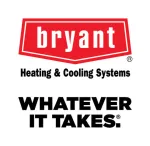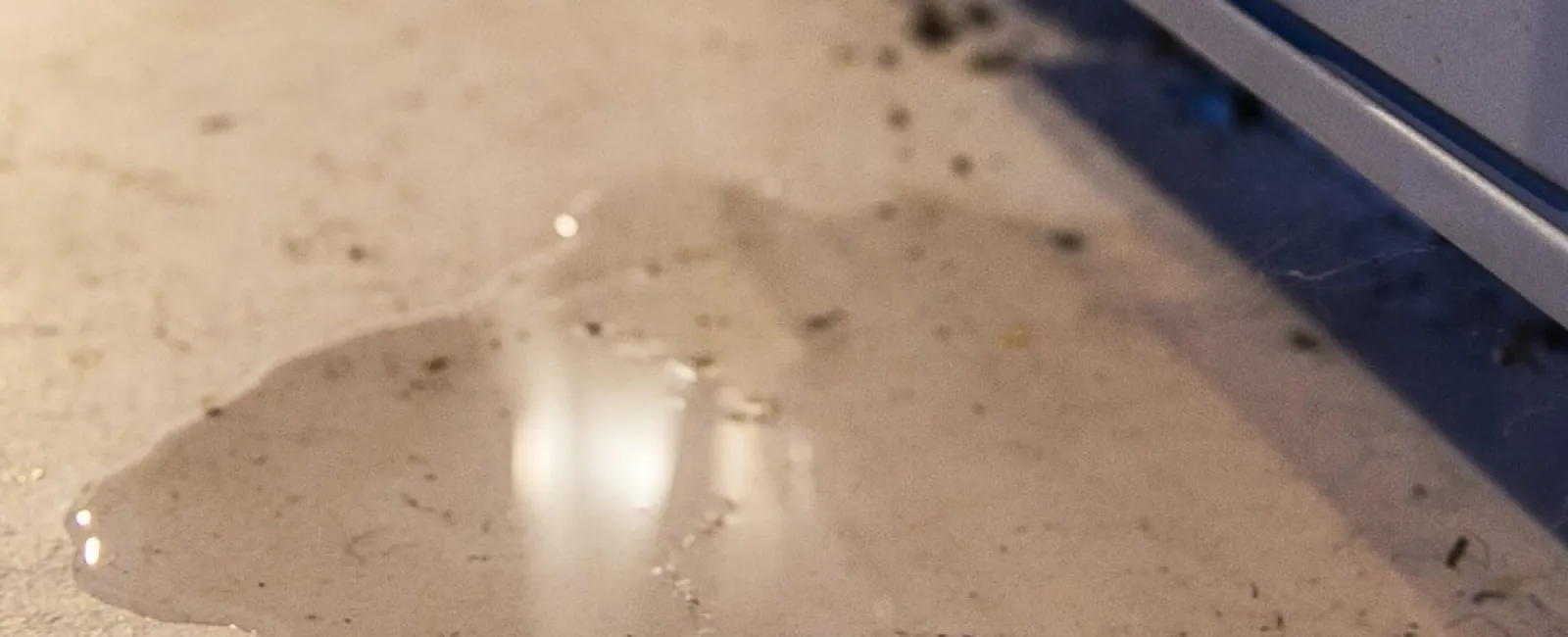Your air conditioner can leak water when the condensation drainage system malfunctions. During regular operation, your AC removes humidity from indoor air, condensing the evaporator coils. This water typically drains through a condensate line and pan. Water leaks occur when these components become clogged, damaged, or improperly installed. Common causes include blocked drain lines, cracked drain pans, frozen coils, and faulty condensate pumps.
How Does Water Form in an Air Conditioner?
Air conditioners are designed to cool your home while simultaneously removing excess humidity. As warm indoor air flows over the evaporator coil inside your AC system, the coil cools the air and causes moisture to condense. This process resembles how droplets form on a cold glass on a hot day.
The condensed water drips into a pan, called the condensate pan, and is directed outside or to a drain through a PVC line. If this drainage system malfunctions or becomes blocked, the water may back up and leak into your home. While this may seem alarming, the root cause is often a straightforward issue that can be resolved with professional help or routine maintenance.
7 Common Reasons Why Your HVAC May Be Leaking Water
Water leaks in your air conditioning system can have various causes. Let's examine the most frequent culprits and their solutions.
1. A Clogged Condensate Drain
A clogged condensate drain line is one of the most common causes of water leaks. Over time, dust, dirt, and even algae can accumulate in the line, blocking it. When this happens, the water has nowhere to go and overflows from the drain pan. This can result in water pooling near your indoor unit or dripping from your vents. Professional drain line cleaning can usually fix this issue, although homeowners can sometimes clear minor clogs with a wet/dry vacuum.2. Damaged or Rusted Drain Pan
The condensate pan may have rusted or developed cracks if your air conditioning unit is older. These imperfections prevent the pan from holding water, causing it to leak. Replacing the drain pan is a straightforward fix that prevents further water damage.3. Frozen Evaporator Coils
Frozen evaporator coils can lead to water leaks when the ice melts. This issue often occurs due to restricted airflow, dirty coils, or low refrigerant levels. When the airflow is obstructed, or the refrigerant is insufficient, the coil becomes too cold, causing ice to form. Ensuring your system has clean air filters and is regularly serviced by a professional can help prevent freezing.4. Dirty Air Filters
Your air filter plays a crucial role in maintaining proper airflow. When the filter is dirty or clogged, airflow is reduced, causing condensation on the evaporator coil. Over time, this excess moisture can overwhelm the drainage system, leading to leaks. To avoid this, replace your air filter every one to three months, especially during peak cooling season.5. Low Refrigerant Levels
Low refrigerant levels can cause your evaporator coil to freeze, resulting in a water leak when the ice thaws. Signs of low refrigerant include poor cooling performance and hissing or bubbling sounds from your unit. It's important to have a licensed HVAC technician check and recharge your system as needed to prevent further damage.6. Broken Condensate Pump
If your AC unit is located in the basement or another lower level of your home, a condensate pump is responsible for moving water outside. A broken or malfunctioning pump can lead to water backups and leaks. Repairing or replacing the pump will restore proper drainage.7. Improper Installation
Improper HVAC system installation, especially the condensate drain line, can lead to leaks. For example, if the system isn't level, water may pool instead of draining properly. Always rely on experienced professionals for installations to ensure your system is set up for optimal performance.What to Do if Water Is Dripping from Your AC Vent
If you notice water dripping from your AC vent, it's often a sign of excessive moisture in the ductwork. This can happen due to poor insulation or high indoor humidity. To address this, consider improving your home's insulation and using a dehumidifier to reduce humidity levels. Regular maintenance of your HVAC system can also help prevent condensation buildup in the first place.
Preventing Future HVAC Water Leaks in Home
Routine maintenance is the best way to avoid water leaks in your air conditioning system. Scheduling annual inspections with a trusted HVAC professional can help identify potential issues before they become serious problems. During these inspections, technicians will clean the condensate drain line, check refrigerant levels, and inspect the system for wear and tear.
Additionally, homeowners can take a few simple steps to keep their systems running smoothly. Regularly replacing air filters, monitoring for unusual sounds, and ensuring proper airflow around the unit can help prevent leaks.
When to Call a Professional
While some water leak issues can be resolved with basic troubleshooting, others require the expertise of an HVAC technician. If you've tried addressing the problem without success, or if the leak persists, it's time to call in the professionals. Ignoring the issue can lead to more extensive damage, such as mold growth or compromised structural integrity.
At The Air Company, we specialize in diagnosing and repairing air conditioning systems across Metro Atlanta. Our team is equipped to handle everything from clogged drain lines to refrigerant issues, ensuring your system operates efficiently and reliably.
Trust The Air Company for Your HVAC Needs
Don't let a leaking air conditioner disrupt your comfort. Whether you're dealing with water pooling near your HVAC unit or water dripping from your vents, The Air Company is here to help. Our experienced team provides fast, reliable service to homeowners throughout Metro Atlanta.
Contact us today to schedule a consultation and keep your home cool, dry, and comfortable all year.




